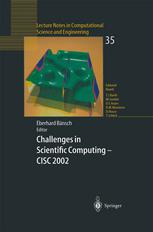

Most ebook files are in PDF format, so you can easily read them using various software such as Foxit Reader or directly on the Google Chrome browser.
Some ebook files are released by publishers in other formats such as .awz, .mobi, .epub, .fb2, etc. You may need to install specific software to read these formats on mobile/PC, such as Calibre.
Please read the tutorial at this link: https://ebookbell.com/faq
We offer FREE conversion to the popular formats you request; however, this may take some time. Therefore, right after payment, please email us, and we will try to provide the service as quickly as possible.
For some exceptional file formats or broken links (if any), please refrain from opening any disputes. Instead, email us first, and we will try to assist within a maximum of 6 hours.
EbookBell Team

0.0
0 reviewsThe conference Challenges In Scientific Computing (CISC 2002) took place from October, 2 to 5, 2002. The hosting institution was the Weierstrass Insti tute for Applied Analysis and Stochastics (WIAS) in Berlin, Germany. The main purpose of this meeting was to draw together researchers working in the fields of numerical analysis and scientific computing with a common interest in the numerical treatment and the computational solution of systems of nonlinear partial differential equations arising from applications of physical and engineering problems. The main focus of the conference was on the problem class of non linear transport/diffusion/reaction systems, chief amongst these being: the Navier-Stokes equations, semiconductor-device equations and porous media flow problems. The emphasis was on unsolved problems, challenging open questions from applications and assessing the various numerical methods used to handle them, rather than concentrate on accurate results from "solved" problems. Thanks to the participants it was an interesting meeting. The presentations stimulated exchanging ideas and lively discussions. This proceedings comprises 13 papers form the conference, ranging from numerical methods for flow problems, multigrid methods, semiconductor and microwave simulation, solution methods, finite element analysis to software aspects. This interesting conference would not have been possible without the help of the staff of the WIAS. I thank all participants, and all our supporters, especially those not onstage, for making the conference a success.